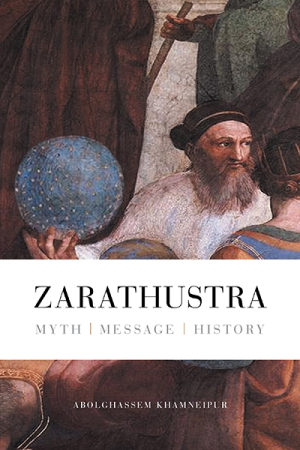Zarathustra
Myth - Message - History
This fascinating, passionate work is notable for its meticulous, intelligent approach to world history.
A thrilling and expansive new work from Abolghassem Khamneipur seeks not only to explore an underappreciated religious tradition, Zoroastrianism, and its founder, but to highlight how influential its teachings have been to a variety of other world traditions. Historical inquiry and a sense of curiosity mark this provocative new text.
Today, the name “Zarathustra” is most likely to evoke Nietzsche’s work, not the enigmatic seeker-cum-prophet himself. Khamneipur remarks upon this from multiple angles, both lamenting the lack of attention paid to the influential thinker and pointing out that Zarathustra, when he does appear in conversations, is most often used as a tool for those forwarding their own agendas. Yet Khamneipur seeks to show that “Zarathustra[’s] view and religion endures … millennia after him, if not directly, than in the form of other religions.”
To bolster this assertion, Khamneipur undertakes a thorough historical survey, not simply of Zarathustra’s time and of Zoroastrian development after him, but of all surrounding traditions and national movements. He suggests that monotheism was not a natural development, but one that had to be pushed by a charismatic figure like Zarathustra, and cites a failed semi-monotheistic experiment in Egypt as an example.
He shows that other scriptural traditions borrowed from the Zoroastrian worldview on topics ranging from the afterlife to the importance of light. He credits certain religious successes—the reestablishment of early Israel under Cyrus, and the penning of much of the Tanakh; Constantine’s religious endeavors; the military successes of Muhammad and perhaps even the authorship of some of the Quran—to the benevolence and generosity of Zoroastrian leaders and thought.
Such concepts are sure to provoke a firestorm of response from the religious establishment, both inside academia and among those who practice. If Khamneipur’s convictions do sometimes run counter to popular scholarship—he does not always, for example, thoroughly critique the other shocking texts he draws in, including Freud’s Moses and Monotheism—his work is notable for its meticulous, intelligent approach to world history. His time line is not perfectly linear from chapter to chapter, but his passionate, inquisitive tone carries interest through and makes any required mental juggling worthwhile.
Those who study the monotheisms often remark upon the unfortunately minor presence of Zoroastrianism in academia; Khamneipur’s work stands to fill this absence. Because it covers both the religious tradition and its lasting, misunderstood influence, Zarathustra: Myth, Message, History is an invaluable introductory text in the field of the monotheisms, whether or not all will rush to concede the author’s points.
Reviewed by
Michelle Anne Schingler
Disclosure: This article is not an endorsement, but a review. The publisher of this book provided free copies of the book and paid a small fee to have their book reviewed by a professional reviewer. Foreword Reviews and Clarion Reviews make no guarantee that the publisher will receive a positive review. Foreword Magazine, Inc. is disclosing this in accordance with the Federal Trade Commission’s 16 CFR, Part 255.

